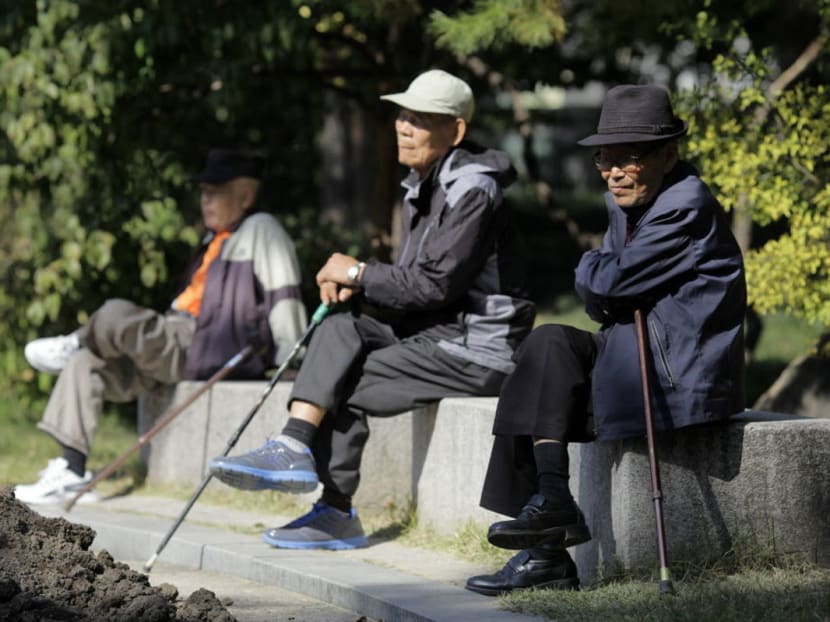South Korea can’t get old folks to spend their savings
SEOUL — South Koreans are getting older and spending less, making it more difficult for the central bank to stoke spending and price gains to keep the nation’s tiger economy powering along.

Elderly men sit on benches at Tapgol Park in the Jongro-gu area of Seoul, South Korea. Photo: Bloomberg
SEOUL — South Koreans are getting older and spending less, making it more difficult for the central bank to stoke spending and price gains to keep the nation’s tiger economy powering along.
Mr Cho Woang Lae, a retired engineer living in Seoul, is like many of the 7.6 million South Koreans who are 60 or over and see the Bank of Korea’s recent interest-rate cuts as harmful rather than helpful.
Conventional economic wisdom doesn’t apply to Mr Cho. Record-low rates haven’t encouraged the 64-year-old to borrow and spend or invest. For him it means lower returns on the 300 million won (S$373,317) bank deposit that helps fund his retirement.
“People say I should invest in stocks, but I’m no good at that, and a bank deposit is what I prefer,” says Mr Cho. “I feel I need to prepare for a low interest rate era. It makes me think twice before buying something or eating out at a restaurant.”
The Bank of Korea has cut the benchmark interest rate three times since August 2014, to an unprecedented 1.75 per cent last month. Still, there are few signs of strength in consumption and the household savings rate rose to the highest level in ten years in 2014.
“Changes in South Korea’s demographics are the key reason why rate cuts aren’t boosting consumption,’’ said Mr Kim Seong Tae, a Sejong-based research fellow for Korea Development Institute. “If you think you’re going to live longer and are unsure of what’s going to happen in the future, there’s little incentive to spend more and save less, despite the low rates.”
BOK Governor Lee Ju Yeol is aware of the dilemma. He’s told staff at the bank it’s clear “structural factors’’ including rapid ageing have changed the way that monetary policy affects the economy. He’s also said to reporters that the biggest hurdle to economic recovery in South Korea is weak domestic demand, rather than problems with exports.
Similar demographic problems are troubling policy makers in neighbouring Japan, and many developed economies with ageing populations. To get a handle on the issues, economists are studying everything from the spending patterns of retirees like Mr Cho to their power at the ballot box and the impact they have on technical indicators like the labour force participation rate and nominal wages.
The ratio of people aged 65 or over is projected to rise to 32 per cent by 2040, from about 13 per cent now, data from Statistics Korea show.
Mr Park Jong Kyu, a researcher for Korea Institute of Finance in Seoul, sees rate cuts at best affecting markets for property and stocks, and doing little to boost consumption.
“With an ageing population, we’ve got fewer working-age people and an increasing number of baby boomers retiring, making the total amount of income less than what it used to be,” says Mr Park. “It might be impossible to raise the level of consumption to match the past, although this doesn’t mean we should give up policy efforts.” BLOOMBERG






